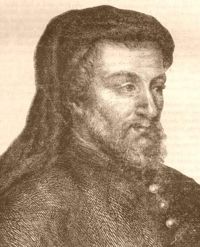Geoffrey Chaucer
 From Conservapedia
From Conservapedia Geoffrey Chaucer (1343–1400) was the father of English literature and the author of The Canterbury Tales. He was the first author to raise vernacular English to the artistic level of French or Latin.
His writings are in Middle English, which is so different from modern English that they are usually read in modern English translation.
Some other major works of Chaucer are Troilus and Criseyde, The Book of the Duchess, The Parliament of Fowls, The House of Fame, and The Legend of Good Women.
Here are some of his most famous quotations:
- "He was a verray parfit gentil knight." (Canterbury Tales, General Prologue, line 72)
- "His studie was but litel on the Bible." (General Prologue, line 440)
- "For gold in phisik is a cordial, / Therfore he lovede gold in special." (General Prologue, lines 445-46)
- "That feeld hath eyen and the wode hath eres." ("The Knight's Tale", line 666)
- "To maken vertu of necessitee" ("The Knight's Tale", line 2190)
- "Ther nys no werkman whatsoevere he be, / That may bothe werke wel and hastily." ("The Merchant's Tale", lines 588-89)
- "And for to se, and eek for to be seye" ("The Wife of Bath's Prologue", line 542)
- "That he is gentil that dooth gentil dedis" ("The Wife of Bath's Tale", line 314)
- "Therfore bihoveth hire a ful long spoon / That shal ete with a feend." ("The Squire's Tale", lines 596-97)
- "Ful wys is he that kan hymselven knowe." ("The Monk's Tale", line 153)
- "Mordre wol out." ("The Prioress's Tale", line 89)
- "But al thyng which that shineth as the gold / Nis nat gold." ("The Canon's Yeoman's Tale", lines 243-44)
- "Of harmes two, the lesse is for to chese." (Troilus and Criseyde, book II, line 470)
- "Oon ere it herde, at the other out it wente." (Troilus and Criseyde, book IV, line 434)
- "Go, litel book, go litel myn tragedie." (Troilus and Criseyde, book V, line 1786)
- "The lyf so short, the craft so long to lerne" (The Parliament of Fowls, line 1)
- "Nature, the vicaire of thalmighty lorde" (The Parliament of Fowls, line 379)
Categories: [British Authors] [British Poets]
↧ Download as ZWI file | Last modified: 02/27/2023 13:59:51 | 28 views
☰ Source: https://www.conservapedia.com/Geoffrey_Chaucer | License: CC BY-SA 3.0
 ZWI signed:
ZWI signed:
 KSF
KSF